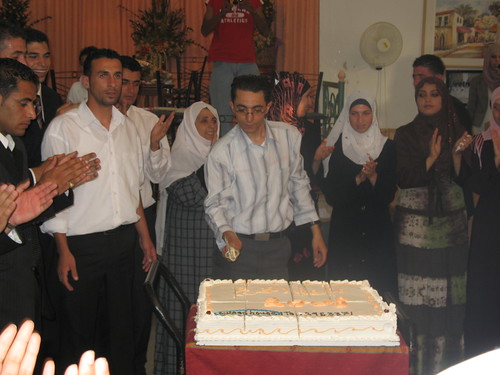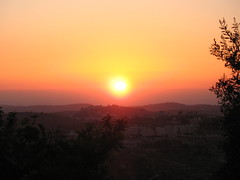Due to some blogger.com problems and being busy, I have accumulated some posting over the last couple of days that I will now present in amalgamated form:
Spotted!One Smart Car (you know, the dinky little ones), with German number plates. I think there is a Goethe Institute in Ramallah as well as a consulate, but I'm not 100% sure.
Palestinian HospitalityFor the UEFA cup final on Wednesday (more on that later), I manage to wrangle an invitation (it was a genuine invitation though) to my friend M's house since I don't have a TV. Since Palestinian hospitality, (in fact, probably Arab hospitality, but I don't have much of a comparison) is different from what we might enjoy in the West, I thought I would record my experiences here.
Firstly, you are not allowed to do or pay for anything. Even the taxi ride there and back was part of deal, no matter how much I protested/tried thrusting notes into my host's hand. Secondly, even though M. invited me, it was as if his whole family had, in the sense that there was a collective effort by his brothers and parents to make me feel welcome and attend to my needs.
After arriving, and greeting the aforementioned parents and brothers, M. showed me his family's land, which has a good view of the neighbouring village and an Israeli settler-colonist road that divides the two villages from each other. (The only way to go from one to the other is via a tunnel built specially for the purpose of keeping Palestinians out of sight and out of mind). M. family grow a number of fruit and vegetables, including zucchinis/courgettes that, when stuffed, formed part of a delicious dinner. M. house consisted of a kitchen, living room, and three bedrooms. One for the boys, one for the girls and one for the parents. The second floor is a work in progress, although in this case, I'm not sure how much progress is being made. (Palestinians often build their houses in a piecemeal fashion, because of the cost relative to income). We ate dinner in the living room, which was quickly converted into a dining space by moving the table that was against the wall and bringing in some auxiliary chairs (c.f. Peter Kay).
As well as the stuffed zucchinis, M. mum had roasted a chicken and made Warad Diwali (stuffed vine leaves). Yum. M. and I with his younger brother. I've noticed that families here don't necessarily eat all at once, except perhaps on weekends, since different schedules often mean different eating times. Then we moved into what I can best describe as their garage area, where we smoked an aiguilles with a couple of M. friends from the village.
When it was time for the game to start, we actually went to a local cafe (due to TV reception difficulties at home), which here looked more like an enlarged concrete container. Needless to say, Boro got humiliated, and it was a little before midnight when the final whistle was mercifully blown. Depending on where you live, 'public' transport finishes any time between 7pm and 10pm here, so if you visit someone's house, you're staying the night.
M., his younger brother and I were all shacked up in the boys room. Here in Palestine, large numbers of siblings (seven to eight in some cases) share the same sleeping space, and I've been curious about how this has actually been accomplished. In M. case, there is a pile of mattresses and a shelf with blankets and pillows on. You grab one of each, and then find a space on the floor. Since two of M.'s five brothers are married and have their own house, there's not too much of space issue in this case. His other brother slept in front of the TV in the living room. Apparently this is also a long established habit.
The next morning we got up at 6:30, had a quick cup of tea, and were on the bus to the university by 7.
Fuel CrisisI never know exactly how much media coverage certain events over here are receiving in different parts of the world, but believe me, the current fuel crisis which you may or may not have heard about it a huge deal here. Palestine receives all its petrol and diesel from one Israeli company, which decided to stop supplying fuel after the Israeli government stopped using Palestinian tax money, (which they are currently withholding illegally,) to pay the debt owed to the company. It's hard to imagine not having any fuel. The impact is phenomenal here. Not only do hundreds of thousands of people rely on jobs that involve driving, but millions rely on the services (taxis) to get from one place to another on a daily basis. Since the services need refueling far more regularly than private cars, the impact of the shortages is already being felt. Since today is Friday - when most people don't go to work - tomorrow will be the first day when the effects of the fuel shortage can be seen and felt. One taxi driver was already complaining that Israelis pay 20 NIS (shekels) for the same amount is costs Palestinians 100 NIS to buy. I read people may start going to the settler-colonist petrol stations. Palestinians' have a well-established ability to cope with the various problems the Occupation throws at them, and I also heard people have already started experimenting with engine fuel and other substances to keep the cars running.
UPDATE: Apparently Abbas has managed to secure the supply of petrol by taking money from the Palestinian Investment Fund to pay the debt. I don't know what this fund does, but I'm sure when people (probably foreign governments) were contributing to it, they didn't intend for the money to end up in the coffers of Dor Allon - the Israeli company that supplies the fuel).
Swimming PoolsTalking of Occupation related problems, any one who has visited Palestine, particularly in the summer, with be aware of the limited access to water here. However, after some friends invited me to go swimming (a trip that had to be postponed because of the fuel situation in fact), I've learnt that there are a number of pool at least in the central area of Palestine, that are built on top of natural springs.
And finally…how to get to GazaI'm sure many Palestinians would like to know how to do this. Well, the other day I was speaking to a young woman who lives in Jerusalem (and hence has a Jerusalem ID, which allows her to travel all over Israel). Her mother's family lives in Gaza, and prior to the Intifada, it apparently took them just two hours to drive down and visit. (The same amount of time it took me to visit my family when I was doing my BSc). However, since permission from the Israeli Authorities to visit Gaza is now more of a historical relic than something that actually exists nowadays, these visits no longer take place. However, a few years ago this woman's grandfather was seriously ill, and so her father and mother had to go. Permission to travel there was, as usual, denied, so her parents ended up going to Amman in Jordan, then flying to Cairo, and from Cairo across the Sinai to Gaza. Apparently this incredible feat was accomplish in one day, albeit a very long and tiring one. It's amazing that no matter how long you live in Palestine, there are always a whole host of stories like this that continue to astound and shock you.
 Sunset and shadow on my wall.
Sunset and shadow on my wall. Sunset and shadow on my wall.
Sunset and shadow on my wall.
 Yesterday's sunset
Yesterday's sunset